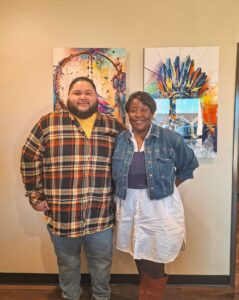
Defining Success: Lessons from Hursh Juneja's Career in Technology
May 29, 2024 by Jessika Leatherbury
By: Sunnie Dawn Baker
 Hursh Juneja started watching Star Trek in her youth; it is what drew her already inquisitive mind to learn more about science and technology. She had always been curious about how the world worked–why are things happening and how are they happening? While the stories were fun, and the science-fiction technology was interesting, what appealed to her most about Star Trek was the idea that knowledge can be used to empower and impact not just our own planet, but the whole universe. She wanted to do something to make her contribution. This eventually led her to undertake graduate studies in computer science. Computer science influences every aspect of our lives today, even more profoundly than when Juneja was a young girl watching Star Trek in her living room.
Hursh Juneja started watching Star Trek in her youth; it is what drew her already inquisitive mind to learn more about science and technology. She had always been curious about how the world worked–why are things happening and how are they happening? While the stories were fun, and the science-fiction technology was interesting, what appealed to her most about Star Trek was the idea that knowledge can be used to empower and impact not just our own planet, but the whole universe. She wanted to do something to make her contribution. This eventually led her to undertake graduate studies in computer science. Computer science influences every aspect of our lives today, even more profoundly than when Juneja was a young girl watching Star Trek in her living room.
Juneja, the Head of Enterprise Architecture and Innovation/Information Technology for the Chickasaw Nation, found herself in Ada, Oklahoma after a long and successful career working for high-tech, fin-tech, and consulting companies like IBM, Oracle, HP, Fiserv, and ACS group. She had already worked on and led large projects of national importance at her first job in India and had since then led enterprise-wide high-profile technology integrations and transformations at Fortune 500 companies in Thailand and the United States.
Though she faced some challenges like most people, finding her own work-life balance, especially after becoming a mother, was one of the greatest for her. Juneja says, “I wanted to be the best mom I wished to be and still do the best job at my work, which was very demanding. And I also wanted to be a good wife, a good daughter, a good sister, a good community member.” To attempt all of this, she would put the kids to bed at 10:00 pm, work from home until 1:30 am, and then be up again in the morning at 5:30 am to pack lunches for the day. While she got everything done, the pace was not sustainable. However, Juneja was constantly learning, both from the world around her and her own experiences. This led her to make changes in her life and, instead of insisting she must be the “best” at everything, she instead chose to adopt a method she calls “define your success.” By defining what success means to you at each phase of your life, you can focus on achieving specific goals rather than becoming frustrated by constantly shifting societal definitions of success and your own unrealistic expectations. She also suggests viewing it as “work-life integration” rather than two conflicting things needing a balance. Technology has made it possible now in most part.
Juneja takes this idea of “defining your success” even further, encouraging people to also “define your life’s purpose.” While success and purpose can go hand in hand, there are slight differences, and defining an overarching purpose can lead to a meaningful definition of success at every stage of your life. This sense of purpose can shape a life and provide the focus needed to define what success truly means for a period of time, as well as providing the road map to achieve it. Juneja suggests returning to one’s definition of success every three to six months, or at least annually, to see how it is going and refine it as needed. It is this constant process of reflection, revision and accomplishing that, Juneja says, “Can bring so much jubilation – as you are in the driver seat now.”
In addition to defining success and purpose, Juneja encourages others to actively seek projects and ideas that will challenge them. This is in large part to the confidence her parents instilled in her when she was young. They were her first advocates and believed that she could do whatever she set her mind to. While the resources were limited as a middle-class family in India, she believes it was their love and support, that gave her the security to keep challenging herself. She says, “Pursue jobs, roles, assignments that will push you to learn something new and do something new, keep pushing your envelope. We don’t always understand the potential from these situations.” In a similar way, she also warns others against thinking too narrowly about their skills or potential. While someone might be “techy,” they also need to develop people skills and business knowledge. While we do need experts, she notes, “The best innovations come from connecting the dots. There is hardly any complex problem solving that happens without holistic thinking.” The more you learn and absorb in your own field, as well as other fields, the more apt you are to solve problems creatively. Likewise, never be afraid to fail. Juneja says, “Own your failures and own your mistakes. Don’t be ashamed. Don’t be afraid.” While she has had successes, she has also had failures, but because she viewed the failures as learning experiences, they became tools of self-reflection that led to greater success in the end.
When Juneja was a child, she only knew that she wanted to make an impact bigger than herself, though she didn’t know how. She didn’t know if she would end up working with the elderly or in an orphanage or in the most impoverished parts of Africa. In the end, though, computer science has afforded her the chance to make an impact. She says, “This field, at least in my lifetime, has had the biggest impact for the human race. For example, it has improved health care and diagnoses; it has enabled distance learning for people in small villages who have internet but no teachers.” Computer science has also helped her as she moved between different countries, states and cultures, acting as a skillset and talent that remains relevant and valuable to different people and places, whether it was in India or in Thailand, or in different states of US where she has lived, or now in Oklahoma. By working in computer science, as well as mentoring and encouraging others, Juneja has that chance to make an impact bigger than herself, and it all began by her passion to have a purposeful life and watching Star Trek.
Sign up to receive more news from the Ada Jobs Foundation HERE!
Written by
Jessika Leatherbury
You may also interested in:

BUILDING FUTURES: WORK READY ADA CELEBRATES ITS FIRST YEAR
BY: CATHLENA SPENCER Just one year ago, Work Ready Ada, a new employment readiness program, was launched in partnership with Pontotoc Technology Center (PTC). The program, funded by Oklahoma Human
AI IN EDUCATION: A CONVERSATION WITH VINAYAK MITTY
BY: SUNNIE DAWN BAKER One of the areas in technology with the most potential for entrepreneurial growth is Artificial Intelligence (AI). AI is increasingly shaping every part of our lives,
Adapt and Overcome: Allison Poe’s Recipe for Resilience and Growth
By: Sunnie Dawn Baker Allison Poe has always followed her feet. She waits for the signs to appear and, once she recognizes them, she travels that path, and has never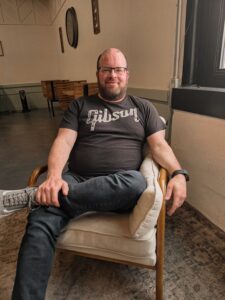
Jeff Warren: A Life in Sound, Vision, and Storytelling
By: Sunnie Dawn Baker When Jeff Warren got involved in the Houston music scene as a teenager, he had no clue where his path would lead. Now, nearly thirty years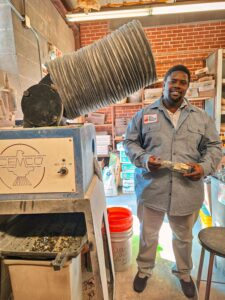
From Pitch to Progress: ECU's Glass Recycling Program Turns Waste into Opportunity
By: Sunnie Dawn Baker In 2018, Dr. Christine Pappas competed in Ada Jobs Foundation’s Big Pitch Competition by promoting grinding glass bottles into sand. She won the Big Pitch that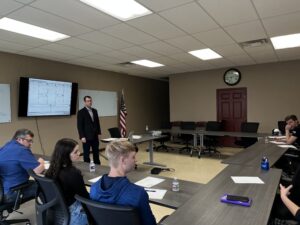
The Importance of Customer Discovery: Know Your Audience and Know Your Market
By: Sunnie Dawn Baker Entrepreneurs and small business owners must consider many factors to achieve success, with their target market being one of the most crucial. Sometimes, when people are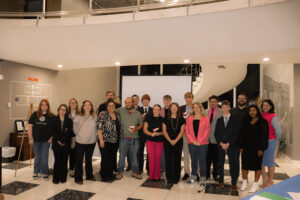
What Does Economic Development Do for You? The Significance of the Economic Multiplier
By: Sunnie Dawn Baker People often find the term “economic development” vague and confusing. Understanding how economic development works and benefits the community can be challenging. Though there are many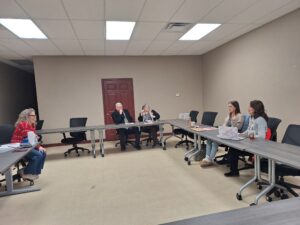
Helping Entrepreneurs One Workshop at a Time: Lauri Rowe and QuickBooks for Small Businesses
Entrepreneurs tend to be filled with passion and big ideas. They have found a solution to a problem they see in the world, and they barrel ahead, excited for their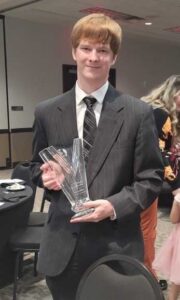
Hunter Cook: Technology, Entrepreneurship, and the Written Word
By: Sunnie Dawn Baker Hunter Cook started writing when he was seven years old. At first, he wanted to write comic books, but then he realized he couldn’t draw. He